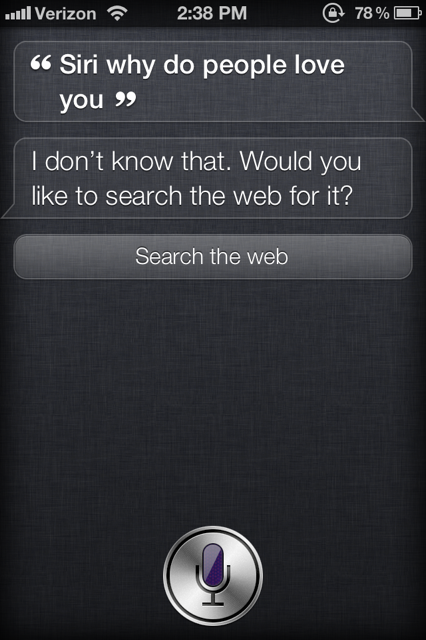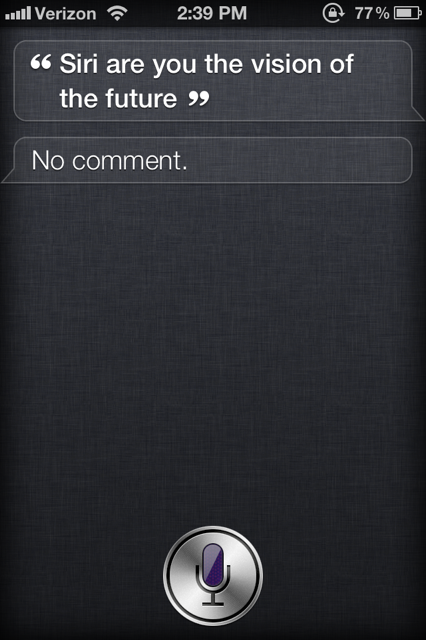

I just read an article on TechCrunch titled
"Siri, Why Are You So Underwhelming." In this article, Jordan Crook talks about some of the disappointments she's had with Siri, and how her initial jaw-dropping reaction to the concept has taken some hits.
This article was completely unsurprising to me. In fact, the whole time the tech media was slavering over Siri, I just didn't get it. What were people SO EXCITED about? After all, the application had already existed before Apple bought it. voice-input was already integrated in almost every native Android action. Yes, I understand that Siri is more integrated, context-sensitive and "gets what you mean" than Android's straight-up text input. And I get the excitement about the step toward better NLP. But why were all these tech-savvy folks so amazed and making such huge claims about usage? Is it really so much easier to "talk at" your phone than tap a few times? Are people really going to want to do this?
I think a part of my reaction boiled down to my doubt that the *user experience* of "talking at" one's phone was the experience many people actually wanted and would do. This lack of usage had already been shown in other applications - for example, in the Android operating system, how many people actually use the built-in
speech-input instead of the keyboard? Yes, it's cool, yes, it's handy sometimes, but I'm doubtful that a large percentage of users regularly utilize speech input. How many people at a dinner party want to say "switch songs" loudly to their stereo system instead of just pressing a button or tapping their phone while their compatriot is chatting to them? Has Apple done any user research (perhaps diary studies?) to try and really find out "is this something people will actually use? When will they use this?" Let me know if so, because I'd love to see that kind of thing.
I'm not meaning for this to be a rant - I'm just trying to get at the core of people's excitement.
My coworker
Kimra mentioned that maybe this whole "telling your machines what to do" thing could be not based on user research, but on a kind of "tech fantasy." This makes sense to me, especially based on all the articles that came out about Siri, with titles like
"A voice-controlled future is finally upon us",
"Apple’s Siri points to an exciting future", and
"Apple's Siri is the fulfillment of a dream from 1987." These articles frequently reference science fiction visions, with sections that read: "This is all very Jetsons-type stuff, the kind of 'they promised us jetpacks' future we’ve all been waiting decades for" and "Ever since HAL refused to open the pod bay doors for Dave we’ve all wondered when we’d get to talk to our computers. Well now thanks to Apple and Siri we
can."
People talking to their machines (and the machines responding intelligently) has been a key staple of science fiction for years. Maybe people aren't actually going to use Siri, but they're in love with the "vision of the future" - in other words, people are excited by the fact that technology is getting more like science fiction's "vision of technology." But we all know that science fiction books and movies aren't based on user research - they're based on the author's fantasies and visions about what they *think* people will want and use in the future. It will be interesting to see if these science fiction visions will actually translate to adoption and usage.
Maybe in the end, Siri *is* something people want and will use. Maybe it *is* an amazing step toward the future. But if so, it will have to work nearly perfectly. People will have to be able to rely on their voice commands working with just as much regularity as their touch commands, or else there's not all that much point in using it. I think part of the reason people have been disappointed is because Apple and various articles promised this near-perfect fantasy. When we actually get to that point technology-wise, I'll be excited to see what people do.